Achieving a dream: M4 Alex Brito matches into neurology
Alex Brito will graduate from Vanderbilt University School of Medicine on May 13, 2022, before beginning residency at Brigham and Women’s Hospital in Massachusetts
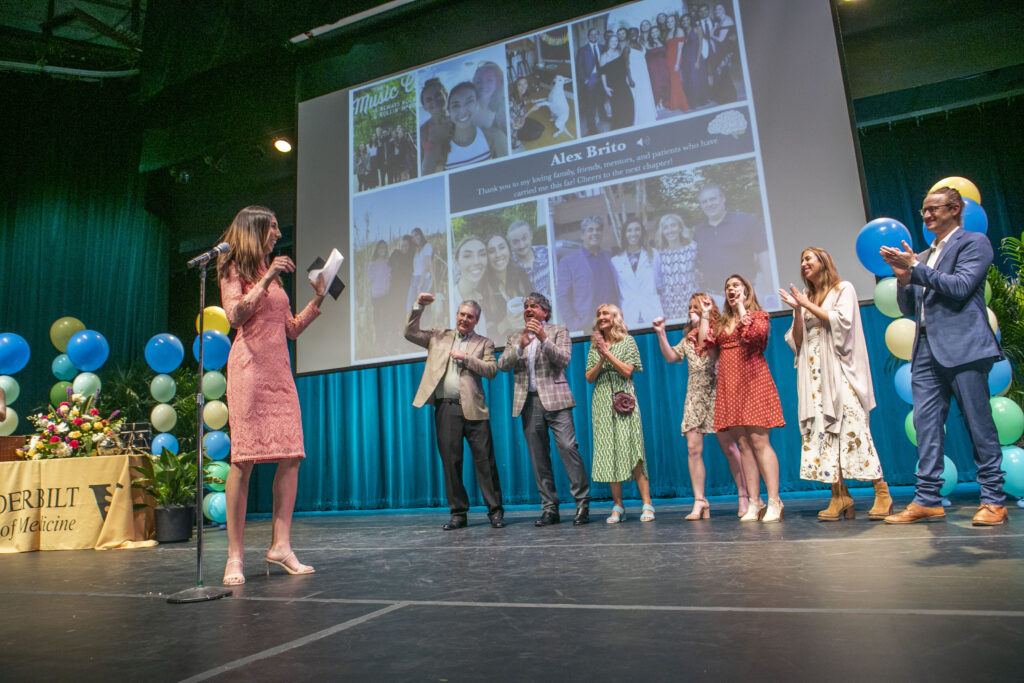
By: Lexie Little
Alex Brito woke with a start. Light streamed through the window as the sun bounced off limestone buildings artfully lining Parisian streets, the windmill of the Moulin Rouge sitting still over the then-silent Boulevard de Clichy below. Still a high school student, she had traveled from her hometown of Nashville to France to study the language and culture while living with a host family. A foreign feeling accompanied usual grogginess that morning. She sat up as a sly smile of disbelieving accomplishment brightened her face.
She had just dreamed in her second language for the first time.
“I can remember specifically having my first dream in French while I was in Paris and what that felt like,” the now fourth-year medical student said. “It was a moment I realized I wasn’t translating French to English, English to French, to produce words. I was taking meaning and producing meaning in another language. It was cool to experience that cognitive process in real life and in that dream. I don’t remember what it was about, but I remember waking up and feeling like, ‘Woah, that was cool.’”
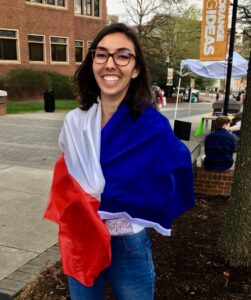
Brito enrolled in her first French courses during middle school following the example of her older sister Zoë, whom she most wanted to emulate. In high school at Franklin Road Academy, teacher Kris Climer organized exchange programs for students during spring break and interim weeks on the year-round schedule. Climer, who had a reputation for strictness, encouraged students to use French as much as possible to improve their skills – in the classroom, at home, and abroad.
A nascent Francophone, Brito ventured to Paris at ages 15 and 17 and welcomed her host sister to Tennessee in the year between. Immersive experiences sparked an interest in the French language as neurons fired to process translations and strengthen memory. But they also sparked an interest in those firing neurons themselves, one that would lead her to a career in medicine, a career that will continue through neurology residency at the prestigious Brigham and Women’s Hospital in Boston, Massachusetts, this summer.
“When people ask me what got me into medicine or what got me into neurology, it was really studying French that interested me in how we process language and what’s going on in our brain when we are starting to learn a new language or become proficient in this new language. That was really fascinating to me,” she said.
Daydreams and degree themes
Before she moved to Knoxville for her undergraduate studies at the University of Tennessee, Brito completed a summer academy experience at Vanderbilt University. The camp focused on literature and cognitive theory, prompting her to think about language and neuroscience. As an honors student at UT, she designed her degree around French and neuroscience coursework.
As she passed bustling students on the hilly pedestrian walkway during banal commutes by foot, she would make mental reminders about her day or tasks ahead.
“I would talk to myself in French while casually walking to class,” Brito said. “When you study a language, it makes you feel proud because you think, ‘Wow, this is not my native language. This is not something I use in my daily life, but I can access this, and it’s starting to come more naturally. I remember being fascinated having access to double the amount of people I could talk to, double the music, double the books I could read. I feel like it unlocked something for me.”
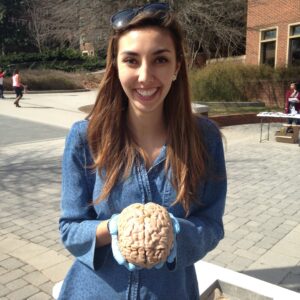
Her intrigue in cognitive processing caught the attention of a fellow honors program student who connected her with Harriet Bowden, an associate professor of Spanish who studies neurolinguistics.
Preparing for studies in the neuroscience lab, Brito and fellow students affixed EEG – electroencephalograph – caps onto study participants’ heads. She watched undulations move across the screen as the EEG measured the brain’s electrical activity. Through this technology, members of Bowden’s lab like Brito could analyze cognitive language processing.
“[Before meeting Dr. Bowden], I had no idea what neurolinguistics was,” Brito said. “We could put a little EEG cap on someone and measure the electrical activity in their brain as they were reading sentences in French or hearing sentences in French. When I started, we were doing it in Latin and Spanish. My thesis ended up being a similar project but in French.”
As the president of the University of Tennessee’s Pi Delta Phi French Honor Society chapter, she knew students with varying levels of language proficiency. She recruited classmates and friends from the program to participate in her study – sometimes offering up a Target gift card in return – to analyze differences in language acquisition.
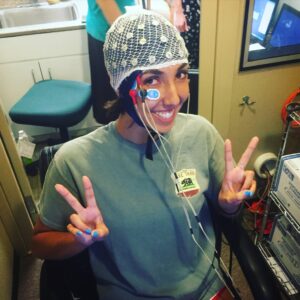
“The nature of that project looked at people who learned French primarily in the classroom versus people who learned French through a more immersive experience like studying abroad. We had them read sentences in French, and I would introduce semantic errors or syntactic errors to elicit an ERP, brain wave, signature,” she explained. “Then, I compared that to native speakers, [a population] that had been previously characterized in the literature. The folks in the immersion group had more native-like processing compared to the classroom group. In my thesis, I discussed the difference in the type of memory we rely on when we’re processing in the classroom versus abroad, and I thought it was really interesting. It was a cool blend of my interests in French and neuroscience, which were seemingly disparate at the time.”
A wake-up call
Outside of her studies, Brito volunteered with a group called Arts and Alzheimer’s. Community volunteers and residents of local memory care facilities or assisted living homes with memory care units met monthly to complete activities together.
Her freshman roommate Abby knew neuroscience interested Brito, so she invited her to go along to one of the sessions at the Howard Baker Jr. Center for Public Policy on UT’s campus. They entered the rotunda to meet the older adults with whom they would arrange flowers, dance, or paint, depending on the fine motor skills of the visitors.
“That experience impacted my career trajectory and was a meaningful experience for me,” Brito said. “It wasn’t a clinical experience, but for the first time, I realized I could apply neuroscience in a way that would improve people’s lives or remind folks who had these devastating neurological diagnoses that there are ways to find meaning. I could also help families prepare for what was down the line.
“There were hard days in that after three years of working with someone, they might not remember me when I walked in the room. Sometimes, we would lose members of that community. But for the most part, it was really rewarding working with them on those hands-on activities. It would spur them to tell stories and trigger memories that even the people who worked with them every day had never heard. They would tell stories about the UT Bookstore or Peyton Manning or really cool things that just being on UT’s campus would remind them of. That was the first time I started to consider medicine as a potential career option.”
The summer before Brito’s senior year, legendary Tennessee women’s basketball coach Pat Summitt died after five years of living with early-onset Alzheimer’s disease. The clinic where Brito interned during her final undergraduate year would be named for Summitt in January 2017.
As an intern in the neuroscience center at University of Tennessee Medical Center, Knoxville, Brito administered cognitive tests to new patients, who often expressed apprehension.
“I was doing assessments for new patients when either a family member or the patient had a concern – maybe they had been forgetful or there was a mood component,” she said. “They came to these appointments super nervous and anxious thinking, ‘What am I going to find out during this appointment? What are the doctors going to tell me? Is there something wrong with the way I’m thinking?’ Usually, if it was a family member that had a concern, there was something going on. If it was the actual patient who had a concern, often it was normal aging and forgetfulness.”
Brito led patients through hour-long series of cognitive tests. She reassured them that some questions would be harder than others, encouraging them not to worry if they feel they answered incorrectly or struggled with a task. She found joy in putting those patients more at ease and allowing them to perform to the best of their abilities, taking the process one step at a time, giving them room to relax.
As Summitt said, “Left foot, right foot, breathe.”
Living in the present
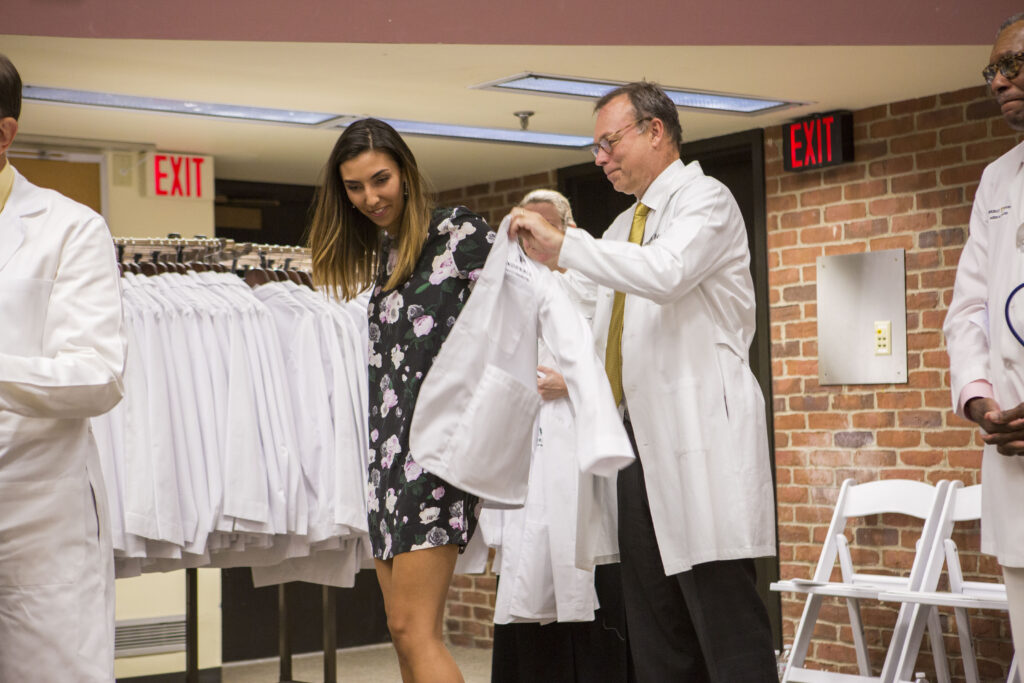
Brito’s next steps led to Vanderbilt University School of Medicine following a gap year as a clinical trials specialist at Duke University Medical Center. When she came to VUSM as a first-year MD student, she felt strongly she would specialize in neurology but kept an open mind. Rotations on OB/GYN and medicine opened her eyes to possibilities in gynecology and infectious disease that she found interesting. But no specialty ever proved more important to her than neurology.
Rotation after rotation, she heard the same question from resident and attending physicians: “Do you have an idea of what specialty interests you?” Students often skirt around an answer, especially early in their medical studies, but Brito openly expressed her interests.
“I would hear that question what seemed like 50,000 times a day,” she said. “I would say I liked neurology, but I was keeping an open mind…I feel like some students would be shocked that I even gave that indication because it’s almost taboo. I’ve never had the experience of an attending or resident ceasing to teach me because I was maybe less interested in a particular specialty than neurology. People can tell when you’re genuinely interested [or not], and I had something to learn from every rotation. I have tried to tell people coming up through medical school after me not to be afraid to explore different things, remind them that they don’t have to be locked in on one specialty, but they don’t have to hide interest in a specialty because sharing might be really helpful in the way you’re taught or the way you learn.”
Brito hopes students in subsequent classes like her Chapman College “Littles,” or mentees, will take her advice. She often sought guidance from her Chapman “Big” and other neurology students on how to maximize her studies and experiences. She also turned to faculty mentors like second-year core neurology clerkship director Dr. Eli Zimmerman.
While Brito says she wants to be like Zimmerman someday, he says working with her is actually the privilege.
“It has been an absolute pleasure to be a part of Alex’s journey into neurology,” Zimmerman said. “She is kind and caring, incredibly smart, and down to Earth – a rare combination. Beyond that, her love for patient care and neurology is contagious. I am beyond thrilled she has chosen to pursue a career in neurology – we are lucky to have her.”
Zimmerman graduated from VUSM in 2010. As a student, he participated in the annual Cadaver Ball tradition of choreographed dances, one that Brito and classmates revived on March 19, after two years without the event amid the COVID-19 pandemic.
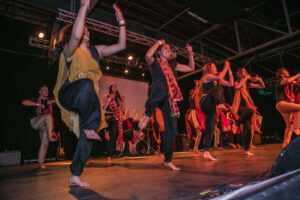
In 2020, second-year VUSM students spent a spring break trip practicing the bhangra, a traditional folk dance native to northern India, on the beach. For weeks, they had rehearsed the jumps and turns to perform at Cadaver Ball. However, national pandemic guidance led to cancelled in-person extracurricular activities.
Updated guidelines in 2022 allowed for the evening of food, fun, and dance at Marathon Music Works. Finally, Brito and her peers performed.
“I do not consider myself a dancer, but it’s been really fun to learn,” Brito said. “Veerain [Gupta] and Pooja [Santapuram] led it. Pooja is my roommate. It started out [in 2020] with me thinking, ‘Oh, I want to support Pooja, she’s teaching this class, so I’ll do it.’ We practiced a bunch…It was so fun. When we realized Cadaver Ball was cancelled [in 2020], we were really bummed. We had gotten the dance down pat. So, I was excited this year when MSA announced that Cadaver Ball was happening. Veerain and Pooja fired up the engines again and started two-week practices for several months. We’d gotten really good at the dance again. We kept the old dance and added a new part. It was like heavy cardio. We were jumping the whole time – something I normally wouldn’t try. It was good.”
Santapuram has lived with Brito for four years. The two met during Vanderbilt’s Second Look Weekend when admitted students interact with each other, current medical students, faculty, and staff before deciding to attend a particular medical school. As they visited hushed labs, excitement bubbled internally while they discussed the prospect of living together.
In high school and college, Brito learned how to read tarot cards, playing cards that date back to the Middle Ages, primarily for the conversations a fun “reading” can foster. The tarot game tradition remains popular in France. When she meets new people like Santapuram, Brito offers to do readings and learns about their aspirations, past, and relationships through questioning to build a deeper foundation for friendship. Santapuram, a future anesthesiology resident at NewYork-Presbyterian/Columbia, knows Brito not only as an “exceptional tarot card reader,” but as a source of support and friendship.
“Alex has been more than just my roommate for the past four years,” Santapuram said. “She has been my confidante, my study partner, my workout partner, my cooking buddy, the one who always has the solution to any problem I have whether it’s how to get through a tough rotation or how to fix the remote, and – most importantly — the kindest, most uplifting friend I could ever ask for.
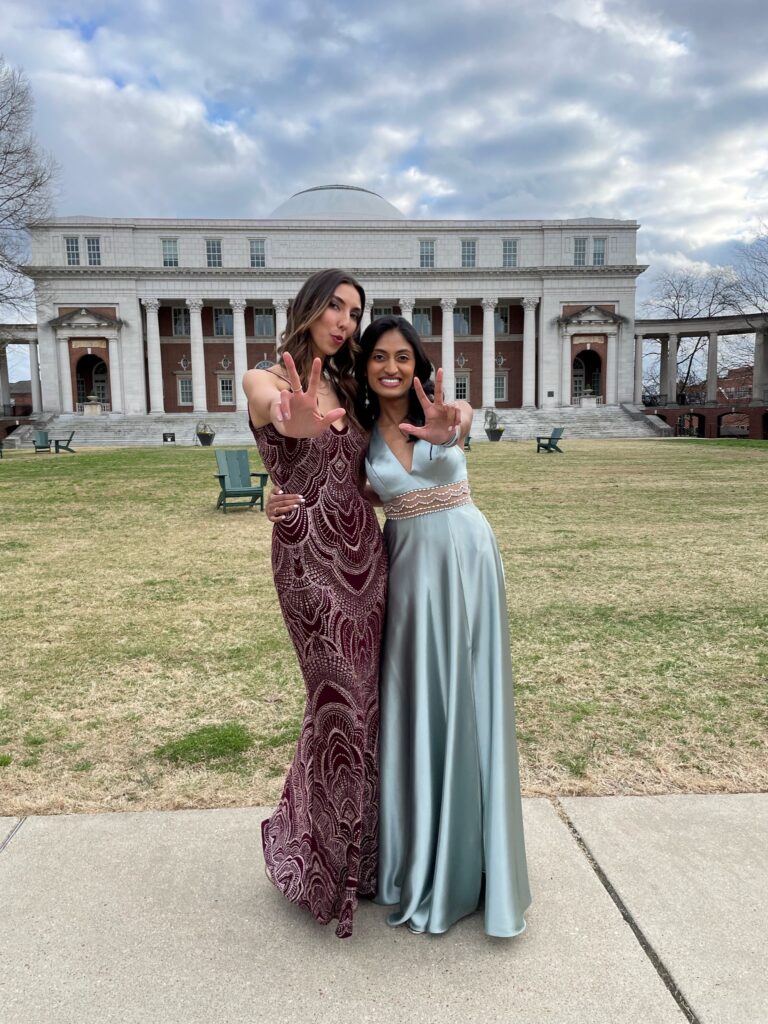
“Alex has a gift of making everyone she interacts with feel heard, regardless of whether you’re her friend, her patient, or a complete stranger. She has set a standard of what it means to provide empathetic care, and it’s clear how much patients enjoy receiving care from her. I still remember the first time I witnessed her empathetic nature during our Second Look Weekend. On the day that I met Alex, we happened to be placed into the same room to have our very first encounter with a standardized patient. I remember feeling so nervous, but not only did Alex put me at ease, she also adeptly displayed a level of compassion and warmth towards the standardized patient comparable to someone that has had years of experience, making sure to address the emotional toll that the patient’s illness had placed on her.”
Santapuram said Brito’s induction into the Gold Humanism Honor Society, which invites students who demonstrate a commitment to compassionate human care, came as no surprise. She and others have learned from example as soon-to-be clinicians, and they remain eager to see how her people-driven talents affect the lives of her future patients in Boston.
In July, Brito will wake to the sight of brick and colonial revival structures. But she won’t be thinking about her dream – she’ll be living it. After all, as French novelist Victor Hugo said, “There is nothing like a dream to create the future.”